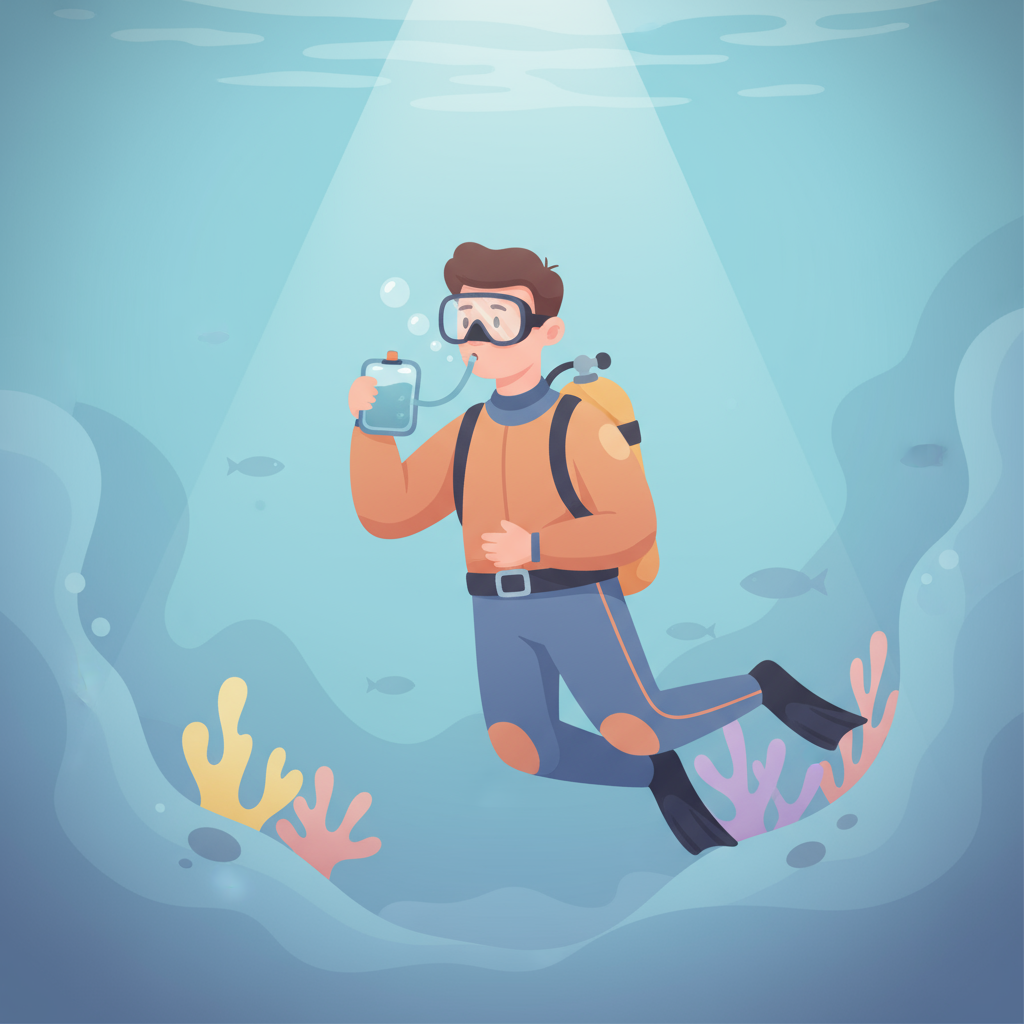Diving is an incredible adventure, but did you know that even being surrounded by water can lead to dehydration? Many divers find themselves feeling tired, crampy, or mentally foggy after dives without realizing that improper hydration might be the culprit.
The good news is that optimizing hydration levels is more straightforward than you might think. By adopting some simple daily habits, divers can feel more energized, stay safer underwater, and reduce the risk of decompression sickness.
This article will guide you through easy-to-follow habits that help you optimize hydration levels and dive with confidence and enjoyment.
Your 3 Daily Habits To Optimize Hydration Levels
Habit 1 — Start Hydrating Early
Why: To optimize hydration levels, begin drinking water well before your dive day. Waiting until the last minute or only drinking when thirsty often means you are already dehydrated.
How: Make it a habit to drink at least three liters of water daily starting 24 hours before your dive. Check your urine color – it should be light straw color. If it is darker, increase your water intake.
Cue: Use a water bottle and refill it each time it empties during the day as a reminder to keep drinking.
Habit 2 — Choose Hydrating Drinks Wisely
Why: Not all drinks hydrate equally. Alcohol, caffeine, and sugary beverages can actually dehydrate you, increasing risks underwater.
How: Focus on drinking pure water enriched occasionally with small amounts of fruit juice or low-sugar sports drinks. Avoid coffee, tea, energy drinks, and alcohol especially before and on dive days.
Cue: Plan your drink options the night before a dive and pack a hydration pouch or bottle with your preferred fluids.
Habit 3 — Practice In-Water Hydration
Why: You lose fluids while diving through breathing dry gas, sweating under your wetsuit, and immersion diuresis. Replenishing fluids during the dive increases safety and comfort.
How: Use hydration systems like bite-valve reservoirs or pouches during longer dives or multiple dive days. Practice sipping water in calm conditions before trying it on challenging dives.
Cue: Pack your hydration equipment with your dive gear and schedule shallow stops for quick hydration breaks.
Week 1 Schedule
| Day | Hydration Focus | Details |
|---|---|---|
| Day 1 | Start Hydrating Early | Drink 3 liters of water throughout the day; monitor urine color |
| Day 2 | Choose Healthy Drinks | Avoid caffeine and alcohol; prepare hydration bottle for dive day |
| Day 3 | Practice In-Water Hydration | At shallow pool or calm water, practice drinking through bite valve or hydration pack |
| Day 4 | Integrate All Habits | Continue early hydration and healthy fluid choices; plan dive hydration gear |
| Day 5 | Dive Day Preparation | Hydrate early and plan hydration breaks during dives |
Troubleshooting
Barrier: Forgetting to drink enough water before the dive
Fix: Set reminders on your phone or use a marked water bottle to track intake and ensure you optimize hydration levels.
Barrier: Disliking plain water which makes drinking less enjoyable
Fix: Add natural flavor with fresh fruit slices or a splash of juice to encourage regular fluid intake.
Barrier: Difficulty drinking underwater during a dive
Fix: Practice in-water hydration several times in controlled environments before relying on it during important dives to improve comfort and confidence.
FAQs
Q: How much water should I drink daily to optimize hydration levels before diving?
A: Aim for at least three liters per day starting 24 hours before the dive, adjusting based on your activity, climate, and personal needs.
Q: Can I drink sports drinks or fruit juices to stay hydrated?
A: Yes, in moderation. Water is best, but low-sugar sports drinks or natural fruit juices can help replenish lost minerals, especially in hot conditions.
Q: Is it really necessary to hydrate during the dive?
A: For longer or multiple dives, yes. Drinking during the dive combats dehydration from breathing dry air and body heat loss, improving safety and comfort.
Tracking & Motivation Tips
Keep optimizing your hydration levels by tracking your daily fluid intake with apps or journal notes. Notice improvements in your energy and dive performance as motivation. Celebrate small wins like consistent early hydration or successful in-water sipping. Sharing your progress with dive buddies can also boost commitment and make hydration a fun group habit.
Key Takeaways to Optimize Hydration Levels
Optimizing hydration levels as a diver involves simple daily habits that build up to a big impact on safety and enjoyment. Start hydrating well before your dive day, choose fluids that truly hydrate, and practice drinking underwater. By making these habits part of your diving routine, you reduce risks like cramps and decompression sickness and dive with confidence and energy.




